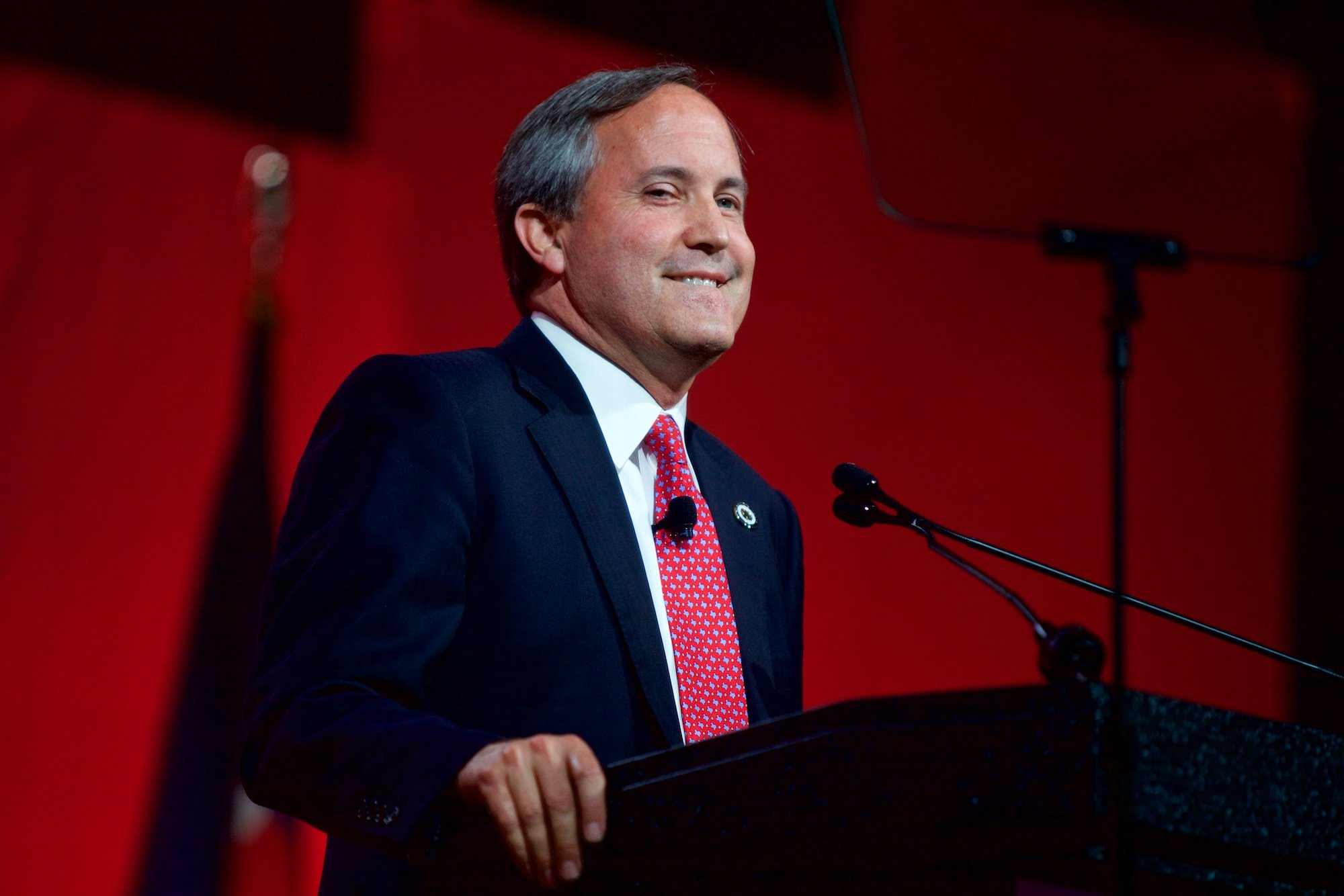
Texas AG Ken Paxton is Very Angry About Women’s Health Programs He Doesn’t Seem to Understand
Paxton is trying to frame a looming battle over federal family planning dollars as one over abortion and Planned Parenthood.


In an error-laden letter sent to the Trump administration Thursday, Texas Attorney General Ken Paxton managed to conflate two different women’s health programs, misrepresent why the state lost control over federal family planning funds and mislead the public for at least the second time this week.
Paxton’s letter urges the Trump administration to give the state health agency control once again over Title X funding, the federal funding stream dedicated to family planning. In 2013, the Obama administration shifted the grant from the state’s control to a nonprofit coalition of health providers after Texas budget cuts devastated the network of family planning providers, leading tens of thousands of women to lose access to care. Now Texas wants that money back, in a looming battle that Paxton is trying to frame as one over abortion and Planned Parenthood.
“There are many things in that letter that are confusing or inaccurate,” said Stacey Pogue, a senior policy analyst at the left-leaning Center for Public Policy Priorities who has been tracking women’s health programs in Texas for years. Pogue said the biggest blunder is Paxton’s apparent conflation of Title X family planning funding and Texas’ pending Medicaid waiver for its Healthy Texas Women Program, which the state created, foregoing millions in federal funding, in order to kick Planned Parenthood out of its low-income women’s health program. The two are different programs, with different funding streams that the state lost control over for different reasons. But the letter sent by Paxton — who this week admitted to spreading misinformation about the Austin bombings in a live Fox News interview — seemed to again confuse media outlets, some of which followed Paxton in linking the Title X letter to the Healthy Texas Women Program.
In the letter, which is the first public acknowledgment that Texas will compete for Title X funding this year, Paxton wrote that federal administrators in 2012 “removed Texas from the list of eligible Title X grant recipients because of our Legislature’s commitment to protecting the lives of the unborn,” and denied Texas the funding for “ideological, not programmatic, reasons.” In fact, Texas competed for the grant and lost. The federal government determined in 2013 that a coalition of providers called Women’s Health and Family Planning Association of Texas (WHFPT) was able to better meet the Title X objectives than the state health agency and shifted the responsibility of administering the funds to them.
Paxton writes that “because of the Obama Administration’s unconscionable, ideological pro-abortion requirements, Title X funding was discontinued to Texas in 2013.” Actually, the funds have continued. WHFPT uses them to support 28 health care providers that operate 90 clinics across Texas, including Federally Qualified Health Centers, hospitals and family planning clinics, including Planned Parenthood. More than 193,000 Texans received family planning services from Title X providers in 2017, the organization said.
“There are many things in that letter that are confusing or inaccurate.”
Paxton’s office did not respond to the Observer’s questions about inaccuracies in the letter, nor whether the AG is aware that Title X funds, like all taxpayer dollars, are prohibited from going toward abortions.
Family planning providers and advocates have worried since Trump’s election about what the new administration would mean for Title X funds and the network of clinics in Texas that they’re still patching back together after budget cuts. Belated new Title X rules from the Trump administration last month confirmed some of their fears. Though the rules do not explicitly exclude Planned Parenthood, the application for the grant funding emphasizes abstinence and faith-based providers, and Trump has already opened the door for states to exclude Planned Parenthood and other women’s health providers from their Title X programs. If Texas gains control of Title X funds this year, it could elect to fund faith-based crisis pregnancy centers, which spread inaccurate medical information in an attempt to dissuade women from abortions, instead of family planning clinics.
“I worry every day about the family planning safety net here in Texas, because it’s taken us a really long time to even start to get back to where we were,” said Kami Geoffray, who runs WHFPT. “If there’s another hit to this network, I don’t know how we’d bring it back.”
Family planning advocates in Texas worry about the state regaining control over Title X funds because of its track record of decimating the family planning safety net in the name of defunding Planned Parenthood. In 2011, the Legislature slashed the state family planning budget by two-thirds. Then, state lawmakers created a new tiered system that put Planned Parenthood and other dedicated family planning providers on the bottom rung for funding, while blocking any clinic affiliated with an abortion provider from receiving family planning dollars. More than 80 family planning clinics across the state closed as a result. Meanwhile, the number of Texans receiving services through Title X dropped by 50 percent from 2011 to 2012, according to a review by the Texas Department of State Health Services.
“It takes a day to close a clinic, it takes years to reopen one.”
WHFPT decided to apply for Title X funding in 2013 to try to repair some of the damage. But rebuilding has been a slow process — one advocates fear could be derailed now that Texas has a conservative ally in the White House.
The Texas Health and Human Services Commission did not respond to questions of how the state would maintain the current level of family planning coverage and prevent further clinic closures.
“It takes a day to close a clinic, it takes years to reopen one,” Geoffray told me late last year. “There are all these threads” holding the family planning provider network in Texas together at the moment, she said. “You pull on one, we don’t know what’s going to happen.”


